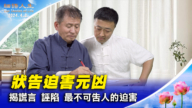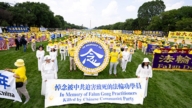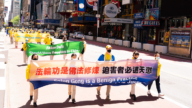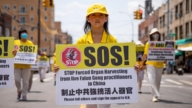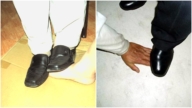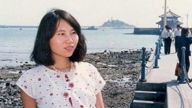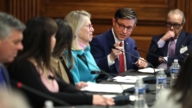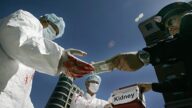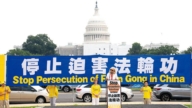【新唐人2014年11月17日讯】国际关注的20国峰会(G20),15号至16号在澳大利亚布里斯班召开。各国首脑、政府要员和国际传媒云集布里斯班。峰会期间,澳洲媒体把停止迫害法轮功作为中国需要解决的首要问题进行报导。峰会前夕,澳大利亚各界纷纷发声,要求中共停止迫害法轮功、并停止强制活摘法轮功学员器官。
14号,澳大利亚广播公司《ABC新闻网》在G20峰会前夕,推出了一个特别报导,聚焦本届峰会最受外界关注的一些议题。
这其中,关于中国急需解决的问题,《ABC新闻网》采访了法轮功学员、原清华大学教师孟约翰(John Meng)。孟约翰自1996年开始修炼法轮功。99年中共开始迫害法轮功之后,孟约翰因为告诉人们迫害真相,而先后被非法入狱9年。在这期间,他经历了剧烈殴打、强制洗脑、剥夺睡眠和奴役劳动等各种迫害。孟约翰还经历了多次强制抽血,这正是中共为强摘法轮功学员器官建立器官数据库的一部分。
孟约翰要求在布里斯班参加G20峰会的中共领导人习近平:停止迫害法轮功,并逮捕迫害法轮功的主要元凶——原中共总书记江泽民等中共高官。
15号上午,法轮功学员在布里斯班的爱玛米勒(Emma Miller)公园内举行集会,向参加峰会的各国领导人和国际媒体呼吁,制止中共迫害法轮功和活体强摘法轮功学员器官的反人类罪行。集会游行受到主流媒体的关注,布里斯班几家最大的电视台纷纷对法轮功学员的活动进行报导,一些国际媒体也来到集会现场进行拍摄。
美国中文杂志《中国事务》总编辑伍凡:“澳洲媒体也好、澳洲国会议员也好,特别强调人权,在人权里边提出来法轮功、西藏、新疆(问题)。法轮功学员也接受了澳洲媒体的采访,把法轮功受迫害、被(强摘)器官移植(的问题)都拿出来了。”
美国中文杂志《中国事务》总编辑伍凡表示,这样的议题在北京的APEC会议上是不可能谈的,在缅甸的东亚峰会上也是不可能谈的。
伍凡:“到了澳洲才有这个可能,所以澳洲就把人权问题、中国向外扩张的问题、法轮功问题统统提出来,看看习近平怎么回答。这个事情已经在世界媒体曝光了。”
据总部位于美国的《明慧网》报导,澳洲绿党领袖、参议员克里斯汀•米尔恩(Christine Milne)表示:如果习近平在澳洲时,澳洲不谈及人权问题,将澳洲与中国的关系仅仅着重于贸易和金钱,就将损害澳洲的立场,损害全球安全。
澳洲联邦政府议员凯利(Craig Kelly),也对中共强摘器官的做法进行了谴责。
国际人权组织“大赦国际”代表声明,“大赦国际”十分关注发生在中国和其他20国峰会领导人所在国家对人权的侵犯。“大赦国际”尊重宗教自由、言论自由和结社自由等基本人权。任何政府在任何情况下限制这些权利,便侵犯了基本人权。
除了人权议题之外,在G20峰会期间,中共的对外扩张等问题,也引来其他大国的关注与批评。
15号,美国总统欧巴马在昆士兰大学发表亚太政策演说。与在北京时相比,欧巴马的口气明显转硬。他强调:美国会继续加强在亚太区的角色,并要求中国无论在贸易还是海上秩序等问题上,都要“遵守跟其他国家一样的规则”。欧巴马谈到:朝鲜的核武和导弹计划、可能升级的领土领海纠纷、未能维护普世人权等问题,都可能危及亚太区的发展。
欧巴马还不点名地警告:亚洲安全秩序不应基于“大国欺负小国的胁迫,而是基于共同的安全联盟”,这被外界解读为暗批中共在南海主权争端上的做法。
16号,欧巴马、澳洲总理阿博特和日本首相安倍晋三,还举行了7年来的首次三边峰会,而且不再秘而不宣,这一举动也被外界认为有向中共示威之意。
采访/易如 编辑/李谦
Australian Media: Falun Gong is One of China’s Foremost Issues at the G20 Summit
The 2014 G20 summit was held on Nov. 15 and 16
in Brisbane, Australia.
Leaders, governmental officials and global media
at the gathering drew the world’s attention.
Right ahead of the summit, many Australians had demanded
the CCP stop persecution of Falun Gong and forced organ harvesting.
In a report from Australia’s ABC News Network, Falun Gong
issue was introduced as being one of the most important
matters needing immediate and proper handling by the CCP.
On Nov. 14, ABC News Network released a special outlook
report of the upcoming G20 summit.
The report focused on issues that draw the most public
concern during the summit.
In reporting issues regarding China, ABC interviewed
John Meng, a Falun Gong practitioner and former lecturer
at Tsinghua Unversity, Beijing.
Meng began to practice Falun Gong in 1996.
After the persecution began in 1999, Meng devoted
himself to clarifying the truth about his belief, and was illegally sentenced to nine years in prison.
During his jail term, Meng experienced torture such as
severe beatings, forced brainwashing, deprival of sleep and mandatory slave labor.
Blood was also forcibly drawn from Meng several times,
which is believed to be used in establishing an organ
database of Falun Gong practitioners
for the CCP to harvest from.
Meng called on the CCP president Xin Jinping to bring
an end to the persecution of Falun Gong, and further
arrest Jiang Zemin and other main culprits
who executed the persecution.
On the morning of Nov. 15, Falun Gong practitioners
gathered at Emma Miller Park in Brisbane.
They called for efforts from political leaders and global
media to end the persecution against Falun Gong and live
organ harvesting, a most atrocious crime against humanity.
The demonstration has drawn attention from
major Australian media.
Major local TV stations reported the peaceful protest.
Some international media also took footage of the activity.
Wu Fan, editor-in-chief of China Affairs magazine:
“Australian media and congress members regard human rights issues as very important.
They brought forward Falun Gong, Tibet and Xinjiang issues
as human rights problems.
Falun Gong practitioners also received interviews
from local media.
They are publicly talking about Falun Gong issues
and live organ harvesting now."
Wu Fan said such issues would have never been allowed
to be discussed in Beijing’s APEC meeting, nor in Myanmar’s East Asia Summit.
Wu Fan: “Those topics can only be touched in places
like Australia.
Therefore this time every issue Australia put forward
are sensitive regarding human rights, the CCP’s military
aggressiveness and persecution of Falun Gong.
They want Xi Jinping to respond to these issues,
which have been widely reported in the world."
A Minghui (minghui.org) report quoted Christine Milne,
an Australian senator and parliament leader
of the Australian Greens.
Milne said that if Australia does not touch human rights
issues on its homeland, Australia-China relations
would consist of trade and money only.
This will negatively impact Australia’s standpoints
and further impair global safety.
Craig Kelly, an Australian parliament member, also publicly
condemned the CCP for mandatory organ harvesting.
An Amnesty International statement said they had paid
close attention to human rights violations taking place
in China and other G20 member states.
Amnesty International seeks respect for fundamental
human rights including religious freedom, freedom of
speech and freedom of association.
Restriction over those rights by any government in any
situation is a violation of fundamental human rights.
Besides human rights issues, the CCP’s military expansion
was also criticized by other G20 members during the summit.
On the 15th, U.S. president Obama addressed his Asia-Pacific
policy in a speech at The University of Queensland.
Obama’s tone has toughened up compared
to his talks in Beijing.
In his speech, Obama said the United States will strengthen
its role in the region, and demand the CCP, “adhere
to the same rules as other nations, whether in trade
or on the seas."
Obama cited dangers that could undermine regional
development, including North Korea’s nuclear and missile
programs, disputes escalation over territory
and the failure to uphold universal human rights.
Obama indirectly warned the CCP by saying, “Asia’s security
order must not be based on coercion or intimidation…
where big nations bully the small, but on alliances
for mutual security."
This is regarded as criticizing the CCP’s aggressiveness
in South China Sea disputes.
On 16th, U.S. president Obama, Australia’s Prime Minister
Abbott and Japan’s Prime Minister Abe held their first
trilateral meetings in seven years.
The meeting was no longer kept secret, which is
regarded as sending a warning message to the CCP.
Interview/YiRu Edit/LiQian


